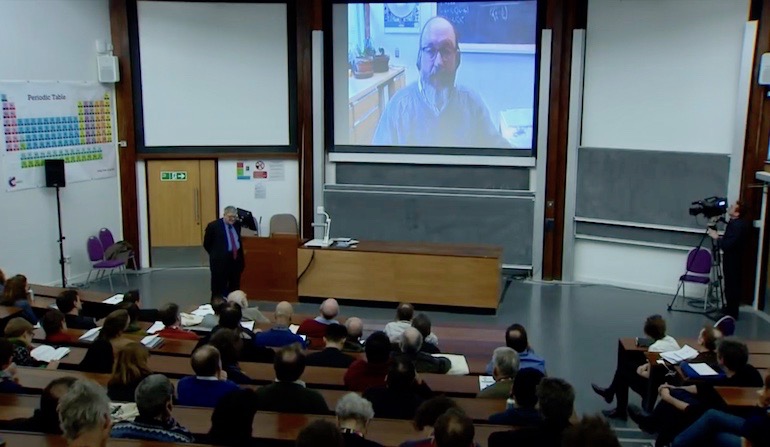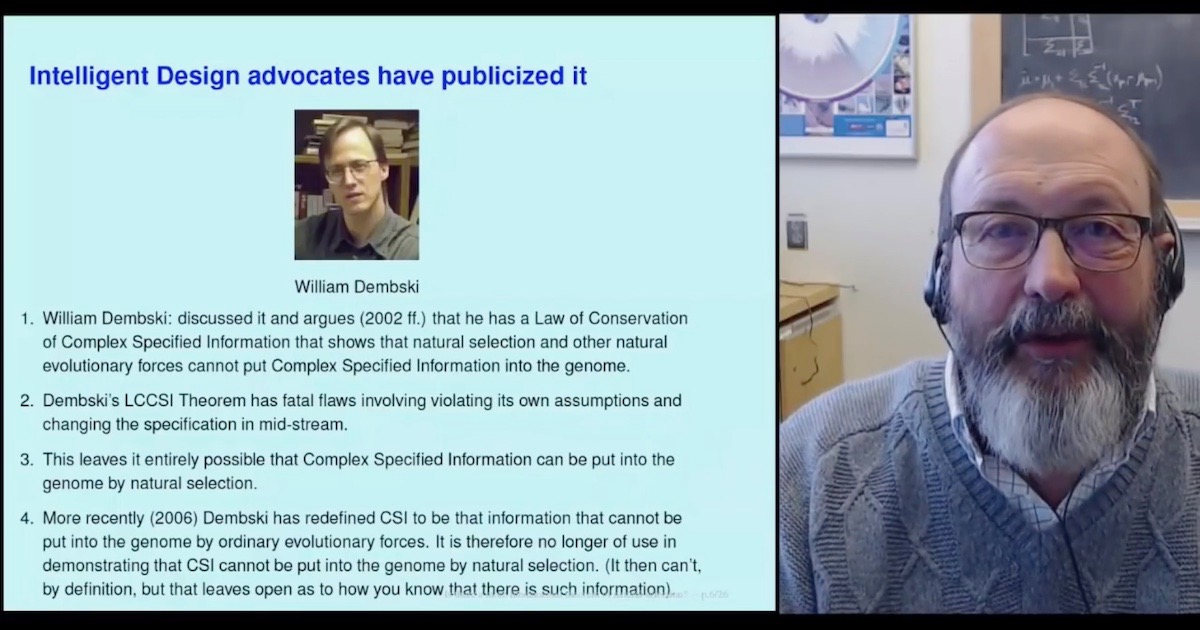 Evolution
Evolution
 Intelligent Design
Intelligent Design
The Law of Zero Magic


One of the most fundamental and useful ideas that has come out of the intelligent design movement is the insight expressed by Bill Dembski as the Law of Conservation of Information. Put simply, the idea is that information does not appear out of nowhere, but can always be traced to a prior source, analogous to conservation of energy or momentum in physics. It has been used to argue that evolution cannot create information, and I think that is true, so long as you properly understand what we are saying. But a lot of critics have not understood it yet.
It has been critiqued from a number of directions; a suspiciously large number of directions in fact: usually if an idea is wrong there is just one main thing wrong with it, so I am always suspicious when any idea is portrayed as “wrong in every way” or gets attacked in a scattergun way. You should be suspicious, too. But that is a topic for another day. Let us talk about one criticism.
Some people think we are saying natural selection doesn’t work. Since natural selection is pretty obviously a real phenomenon, they presume Dembski’s argument must be intellectually vacuous pseudoscientific word salad, and then look for reasons why.
University of Washington geneticist Joe Felsenstein recently repeated his criticism of Dembski’s Law of Conservation of Information. The context was the Fisher Memorial Lecture at the University of Bristol this January. The video was uploaded, and you can listen to his discussion of specified information about 15 minutes in.
It is interesting: he is arguing that specified information is a useful biological concept (I heartily agree) but he feels no one touches it because of its association with ID. Yeah, well maybe if y’all just did science, its association with ID wouldn’t matter so much. He criticizes Dembski, presumably referencing this critique he wrote some years earlier. Have a look at the section “Dembski’s proof.” Winston Ewert already answered this several years ago. You see, these critics (still) agree with us more than they realize, but they keep flogging a dead horse.
The problem is it’s not our horse. Let me tell you about our horse.
First, let us remind ourselves of some terms. Complex specified information (CSI) is an arrangement that matches an independent pattern that is statistically improbable by chance, to the point of being impossible (500 bits is sufficient). The independent pattern is crucial, because it tries to capture the idea of meaning or function, in contrast to Shannon information which is merely an arrangement that is statistically improbable, not caring if it means anything to anyone. Shannon information is very useful to telecom companies and computer engineers, but it’s not what we want to talk about. We want to know if an unintelligent algorithmic process can generate “content.”
Dembski’s argument is that specified information can be transformed by algorithmic processes, but does not thereby increase in quantity. For example, consider a digital document containing CSI. If we encrypt it, we get a file of about the same size. It is no longer in a readable form, but common sense tells us that we have not just the same quantity of information, but the same information in a different form. When we decrypt the document, the decryption process is not creating CSI; it only reveals the CSI that was already there.
The question is if this applies to natural selection, and if so, in what way. Evolutionists need natural selection to be able to actually create CSI, so for them there must be something wrong with the decryption analogy, or something wrong with the definition of CSI. Felsenstein goes for the latter.
I think Felsenstein wants to believe that some starting amount of CSI can be acted upon by natural selection, ending up with a greater amount of CSI. And if so, the initial and final CSI cannot be exactly the same CSI. Therefore he concludes that Dembski’s definition or use of CSI is broken. In particular, he is hung up on the idea that the specification of the encrypted CSI depends on knowing the decryption key. If this is the specification, it is not independent of the process (decryption) that generates the final CSI, and so he thinks it is invalid. But look, even if there were some technical problem with the formalism of Dembski’s argument or the definition of CSI (I am not convinced there is; this is what Winston Ewert was trying to untangle), why not address the common sense argument? The argument about encryption is simple and intuitive; you have the same complex, meaningful information, but transformed.
The idea of CSI is not fundamentally broken. The real issue is that encryption does not add information. Natural selection is different in that respect; the whole point of the neo-Darwinian mechanism is that it could add information.
Believe it or not, lots of ID people agree that natural selection can add specified information, at very least a little bit. For example, parts of the immune system operate by a process like natural selection, “reading” foreign antigens to generate matching antibodies. The ability to identify a particular antigen is new, specified information. But it is not complex. The immune system as a whole is complex, full of CSI, but this complexity is tuned to make the particular adjustments to a new antigen relatively quick and simple, certainly nothing like 500 bits. This is the idea of Active Information at work. Also, the adjustments are transient, depending on which antigens are currently present or not. Few ID people would agree that natural selection adds complex specified information over time, but that argument is a bit further downstream. We haven’t gotten there yet.
Maybe natural selection does sometimes add information. Does that mean the Law of Conservation of Information is wrong? Nope. The LCI is only wrong if CSI is not conserved. It would be wrong if natural selection were magically conjuring information out of thin air, even just a little bit. If nothing else, LCI is a useful heuristic in that it reminds us to check if magic is happening, rather than casually assuming that it is.
So is it magic? No. Natural selection does not create information. At best it reads information, in the form of fitness levels. So where does it read information from? In mathematical language, the possibility space of mutations defines a domain, and the selective fitness defines a range, of a fitness function. This is a theoretical abstraction we can use to abstract away all the details that go into determining fitness (gene sequences, ecological niches, competition, co-evolution, etc.), in order to see more clearly. If there is additional specified information entering into lifeforms by natural selection, it is coming from there, not out of nowhere. In the case of decryption, the specified information comes out of the encrypted file, and the decryption algorithm is merely transforming it. In the case of natural selection, we should say that the specified information is coming out of the fitness function, and the algorithm of natural selection is merely transforming it. Do you see how that works? And do you see how it means the Law of Conservation of Information still applies?
The point of the LCI is not to say that CSI can never increase in any organism, but just to point out that the information would have to be coming from somewhere. There must be a reason for it; everything interesting needs an explanation. The LCI is almost trivially true in that sense.
The way LCI bites evolutionism is not by claiming that natural selection is impossible, or that natural selection can never increase CSI or never improve an organism.
The way LCI bites evolutionism is by pointing out that if selection could construct CSI from scratch, then it could only do so by reading the specified information out of the fitness function. Thus the fitness function needs to contain not just a small amount of specified information, small enough that randomness could explain it (which is another way of saying it is too small to need explanation), but the whole amount; complex specified information. Moreover, just like with encryption, it is the same information, though not unpacked yet.
The mystique of evolutionism is the idea that natural selection explains everything. In fact, natural selection itself explains nothing; it only shoves everything under the carpet. The real origin of the information, if it comes through natural selection, is in the fitness function, and we need to ask why there would be CSI in there, or how it got to be in there. Everything still needs explaining.
By the way, this is not merely an abstract argument. You can see some of the research program it has generated, and more information at www.evoinfo.org.
Photo: Joe Felsenstein and Bill Dembski, via YouTube.
